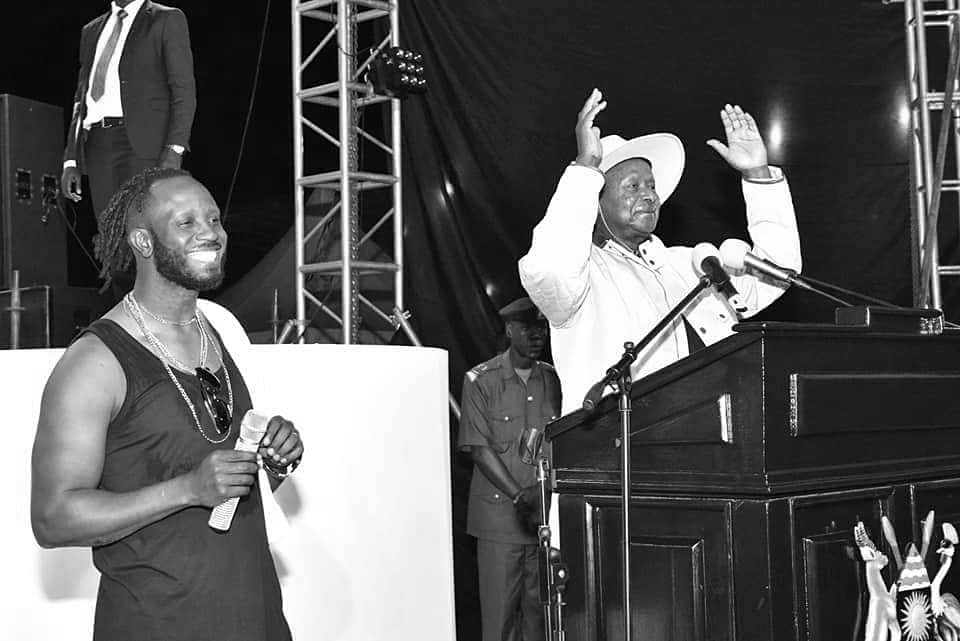Sometimes, it feels like the political administration understands the power of the creative industry. At the same time, the two couldn’t be more parallel.
Over a week ago, President Yoweri Museveni got teary eyes thanks to a comedian that imitates him for a living. The President could be seen helpless laughing out loud and drying his eyes with a napkin.
He was attending an event at Kololo independence grounds to celebrate his 79th birthday.
Herbert Mendo, the popular comedian whose stage name is Sevo, had been called on to the podium for his act. Typical to his craft, he was the spitting image of the President. Clad in a yellow shirt and a hat. His walk to the podium had attracted loud cheers across the grounds. He was accompanied by a bodyguard in the UPDF ceremonial outfit.
“How are you my Bazukulu? I am happy that you have organized this party for me. That means you love me. Clap for yourselves,” the comedian opened his speech leaving no doubt to his masterly of the mimicry of Museveni.
He proceeded… “There are those that have been saying Museveni agende. Mwagala ngoing-e wa? I still have vision. That’s why Mama calls me Baby Face,” Sevo went on and on as President Museveni almost choked on laughter.
Little wonder, when the comedian was through with his 7-minute act, the President was seen ordering his bodyguard to get him an envelope. A token to appreciate this talent.

For a moment, it seemed like at a personal level, Museveni fully comprehended the power of art. The power of the creative industry. It felt like this was the ideal occasion for him to quash the deep-seated perception within the creative sector that he and his government only care about entertainment when it suits them – for politicking and when it’s time to collect taxes.
Yet when he took to the podium to speak, he addressed everything else except the creative industry which encompasses art, music, design, performing arts, film, fashion, crafts, TV, radio and the likes.
Apart from a generic rhetoric that government wants to support the services sector.
Museveni gave key focus to four sectors – industry, commercial agriculture, services and ICT – that he urged the youths to get involved in. On none of the four did he elaborate exactly how government is supporting.
A week later, the President attended another event at the same venue, this time something at the heart of the creative industry – a music album launch. And this time, he pledged to support musicians by availing them funds and equipment.
These remarks elucidate the main problem surrounding government support or the lack of, towards the arts industry. According to the President’s understanding, cash handouts and recording studios are the critical gaps that need to be addressed. And who’s to blame him? Maybe that’s the impression he has got from those (from the industry) he has engaged with.
Just the other day, the deputy Speaker of Parliament, Rt Hon. Thomas Tayebwa, stoked criticism when he posted on X proposing a music battle between two Ugandan music heavyweights – Bebe Cool and Jose Chameleone. He said he “relishes” such a concert and that if anyone was to organize it, they have his full support.
But are these the most pressing needs for the industry?
Stakeholders in the industry have been apprehensive about government’s aggressive campaign to tax entertainment events since the start of the year. The tax measures require an event organizer to pay 18 percent VAT of all tickets sold. On top of a 15 percent and 6 percent withholding tax on foreign and local artistes respectively.
Players in the industry argue that by adopting this shrewd tax regime, government is milking a cow it never fed.
ALSO READ: Is govt’s planned indoor arena what the entertainment industry has long yearned for?
In the last financial year (2022/23), the service sector which is where the arts fall, contributed 42.6 percent to Uganda’s GDP. Collectively, the actual value that the services sector added to the economy was Shs 78.5 trillion.
But even more specifically, the arts, entertainment and recreation activities contributed only Shs 213bn in the same period, according to figures provided to Plugged by URA. This was a 30.7 percent growth from the previous year. When you consider how the taxman has intensified operations to collect more from the industry, the annual collections will likely grow higher.
The contribution of arts, entertainment and recreation to GDP was only 0.83 percent.
Compare this to other services like trade and repairs (26.34 percent), manufacturing (23.1 percent), financial activities (10.3 percent), information and communication (7 percent), construction (2.15 percent) and real estate (1.9 percent).
Arts, entertainment and recreation activities (according to government) include creative, arts and entertainment, libraries, archives and museums, gambling and betting and sports, amusement and recreation activities.
These figures point to two conclusions. Either stakeholders in the music industry exaggerate the contribution of entertainment activity to the economy or a big portion of this activity remains informal and hesitant to file tax returns. If the latter is true, it is fair to argue that government sees no real value to invest in the industry.
An argument can also be made however, that are there is significant indirect revenue that the government draws from entertainment activities. There are over 60,000 bars in Uganda, according to figures captured by breweries which take an inventory of businesses they supply with beer. Uganda Breweries Limited (UBL) alone remitted Shs 430bn in taxes last financial year. No activity drives alcohol sales more than entertainment events and nightlife.
There are other intangible benefits that entertainment and sports generate for the country. Promoting Uganda on the global stage being one of them. Music, film and sport are powerful tools in international relations.
For several decades, the U.S. has used its multi-billion (Hollywood) film industry as a propaganda tool to project herself as the global superpower.
It is this cultural soft power that Ugandan policymakers don’t realize as yet.
RELATED: Uganda misses hosting yet another Daniel Kaluuya movie premiere. At what cost?
While the Ugandan government invests huge chunks of money annually in promoting its culture using embassies and consulates across the globe, the results of these efforts never match the effect of Ghetto Kids (Ugandan dancing troupe) representing Africa in the Britain’s Got Talent (BGT) finale.
Similarly, you can’t tag a price to the impact that a documentary like Chimp Empire (Netflix) which is a window into the politics and survival tactics that characterize chimpanzee groups in Kibale National Park, has on positioning Uganda as a tourist destination.
In the last few years, nobody has promoted Brand Uganda globally better than athletes like Joshua Cheptegei and Jacob Kiplimo.
There is also a school of thought which suggests that the industry is its own enemy.
That the industry isn’t lobbying enough, let alone lobbying for the most critical needs. Why did it take until Dr Hilderman’s tenure in Parliament for the debate about copyright reforms to begin? Especially when there were legislators (among them Kato Lubwama and Bobi Wine) before him that never lifted a finger to push for industry interests.
There have been several times where key players in the industry have interfaced with government at the highest level – both with the President and his powerful brother Gen. Salim Saleh. Not that the two haven’t listened or acted. One needs to scrutinize the outcomes of these engagements to understand where the problem lies. Bebe Cool was given audiovisual studio equipment while several individuals have benefitted from cash handouts from Gen Saleh.
During the Covid pandemic which derailed the entertainment industry, as other sectors pushed for bailouts and policy changes, musicians and promoters secured billions in funds that were poured into a few virtual concerts.
READ MORE: Big Nightlife Businesses Have Shut Down and from what Owners Say, It Will Only Get Worse
Rather than use their uniting bodies to advance common interests like infrastructure (art spaces) and legislation that enable them access capital from government, like other critical sectors do, musicians have for many years resorted to egoistic squabbling that has done nothing but divide them and weaken their voice. Which also begs the question… Should being a musician be the only credential for one to lead these bodies? Or should it be any competent candidate with strong administrative and lobbying credentials?
Which unionizing models do industry leaders benchmark? Just days ago, in the U.S, the body that unites writers managed to secure landmark reforms in working conditions including pay rises and protections from the influence of Artificial Intelligence, following their 5-month-long strike. The Writers Guild of America (a union that brings together over 11,000 screenwriters) held a 150-day strike to negotiate better working relations with the big TV and production companies.
As a result of this strike, the writers will now enjoy better compensation from streaming companies based on how many viewers a film/show gets. Such is the power of collective effort in lobbying.
Never have I seen players in the creative sector push government to have the costly equipment they require to create content or produce events added on the list of URA’s tax incentives.
At the height of the Covid pandemic which forced several nightlife businesses to go under, victims of foreclosures and evictions could not get any redress from government.
To this day, a conversation hasn’t been initiated on why government through Uganda Development Bank (UDB) does not consider the nightlife economy for soft loans the same way it does for agriculture, tourism and agro-processing. The entertainment industry must also make a case for the impact it has on the country’s tourism and job creation, things that President Museveni’s government holds as priorities.
Presented with every opportunity, the creatives have reminded us that they care less about the collective wins and more about personal gain.
MORE: Parliament defers UNCC’s Shs 33bn request for recording studios, citing lack of accountability
Like when Bebe Cool while reacting to Deputy Speaker Tayebwa’s proposal for a battle, argued that the lack of funds is what impeded his music camp (Gagamel) and Chameleone’s (Leone Island) from grooming new talent. Not selfishness and their don’t-steal-my-shine tendency. In other words, implying he needs more tax payers’ money to put to personal use like he did with the studio.
The President himself seems to be aware of and disturbed by this selfishness.
In his remarks at the Kololo event recently, he hinted on it.
“We’re going to support them (artistes). To give them funds and equipment. In fact, we have started. We have supported some, but what I don’t know is why they cannot work together,” Museveni said, perhaps aiming a veiled jab at Bebe Cool whose studio has never served the purpose for which he requested it.
“A studio can be owned by all of you. Now necessarily by one person. I will call a meeting so that we agree on a common user facility for everybody. A facility where you can go and record your music at a subsidized fee,” added the President
Whereas the Head of State is ready to interact with stakeholders in the creative sector, the question remains, do they know what they need? Because if not, they will still be entangled in the same cycle three decades from now.








